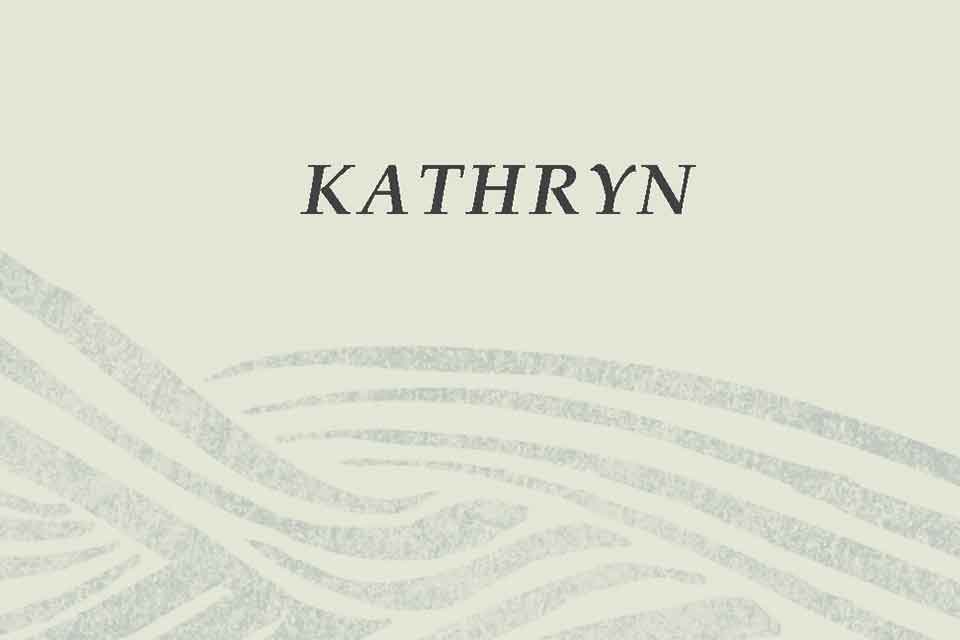Kathryn: Scrambling paycheck to paycheck

Kathryn is a single, 35-year old white woman who works as a receptionist at a downtown hotel in Atlanta. Her language skills have taken her to 75 countries across the globe and kept her building bridges with international travelers as she works in the tourist industry.
Kathryn was born to a middle-class family in Toronto, Ontario, Canada. The eldest daughter of a lawyer and a teacher, followed by four younger siblings, from an early age she displayed a facility with language and a love of learning about cultures different than her own. Her Hungarian-born grandparents who lived in the city, provided an important emotional base. Her grandmother, a confidante and close ally, had worked as a travel agent and traveled extensively, telling stories of her exploits and inspiring Kathryn to do something similar. Kathryn attended French-immersion schools in Toronto and, enamored of her inspirational high school French teacher, found herself newly motivated to get good grades and become involved in extracurricular activities that she had previously avoided. Wanting to follow in her teacher’s footsteps, she went on to major in French in college.
In her senior year in high school, her idyllic family life disintegrated as her father announced his decision to leave his wife to marry the woman with whom he had been having an affair. The revelations rocked the family, Kathryn especially. She was furious as she tried to understand the hypocrisy of her devoted Catholic, “family values” father and his abandonment of his marital commitment. Her parent’s protracted separation and eventual divorce made life emotionally difficult for Kathryn and her younger siblings, but for her and her youngest sister most of all. The scars from that ordeal of fourteen years ago have left her disillusioned with the institution of marriage, although they’ve drawn her closer to the Catholic church. She emphatically insists she has no desire ever to marry. She does not reject romantic relationships all together, and in fact continues to enjoy casual and ongoing sexual and emotional relationships with men, but she no longer believes in love.
Her mother and father insisted that once she turned 18, she was supposed to be a self-supporting adult. While they did help her with college, they have refused to do more. When she graduated, Kathryn moved to the west coast of Canada and taught middle school for five years. She discovered that teaching was not her calling, and decided to pursue her dream of international travel. She found work on cruise ships that not only provided the perfect vehicle for using her language skills but allowed her to visit countries and cultures outside of North America. However, she had accumulated debt in college and her low-paying job as translator meant that her credit card debt piled up as well.
After several years of working on cruise ships, she decided to migrate to the U.S. and permanently settle in a region with less cold and snow and that attracted international visitors. She tried teaching again, this time at the college level. Living far away from her parents and their new spouses provided some emotional relief for her, but she maintained a close relationship to her sister who now lives in Florida.
In Atlanta, she has made a life for herself—found a job that calls on her language skills, joined a congregation in a local church, and rented an apartment in a walkable downtown neighborhood where she does not need a car. The coronavirus epidemic hit the travel industry hard, for business as well as leisure, and hence impacted the hotel where she worked. Kathryn did not lose her job, but her hours were cut drastically and she had to work the night shift. That reduction in her income has pushed her to the brink of bankruptcy in the face of her mountain of debt. She spends hours negotiating with collection agencies and trying to consolidate loans so that she can continue to repay them and remain solvent. Her parents and other family members refuse to help her or lend her money even though they have the resources; “I could never ask them for money cause I, they would never give it to me.” If her grandmother were still alive, Kathryn knows she would selflessly help her, without question.
Kathryn finds comfort and guidance within her Catholic community—she attends church at least weekly. It provides services to the community and cooks meals for the homeless, whose desperate needs have expanded dramatically under the pandemic. More than anything, her source of strength in these COVID times has been “My personal relationship with God, even more so than with the priest or with the other members or like with actual humans that you can see. It's with it's with God himself.”
Looking ahead, beyond the coronavirus epidemic, Kathryn wants to travel again, and optimistically, hopes to make a life for herself outside of North America. She has a vision of setting up a school for street children in Bolivia, where she once visited. Meaning in life would come from “Working there, helping the children, helping the Bolivian people and being free.”
Kathryn describes her economic situation as whatever is “beneath middle-class, but not quite poverty level.” While she was born into the comfortable middle class, her transitory jobs, her accumulated debt, and her now low paying position at the front desk of a hotel means her income is above hand-to-mouth, but she is struggling. “I'm always scrambling paycheck to paycheck.” She celebrates the fact that she now has a “pay down plan” with her creditors, so she sees an eventual end to her debt burden. “Then I think that I will be able to be lifted out of underneath-middle-class and finally, like, scrape my way into middle-class, which is what I want.”